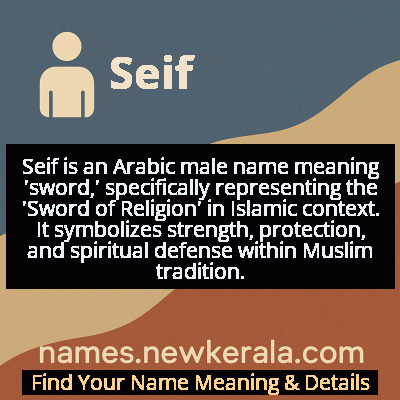Seif Name Meaning & Details
Origin, Popularity, Numerology Analysis & Name Meaning of Seif
Discover the origin, meaning, and cultural significance of the name SEIF. Delve into its historical roots and explore the lasting impact it has had on communities and traditions.
Name
Seif
Gender
Male
Origin
Muslim
Lucky Number
3
Meaning of the Name - Seif
Seif is an Arabic male name meaning 'sword,' specifically representing the 'Sword of Religion' in Islamic context. It symbolizes strength, protection, and spiritual defense within Muslim tradition.
Seif - Complete Numerology Analysis
Your Numerology Number
Based on Pythagorean Numerology System
Ruling Planet
Jupiter
Positive Nature
Optimistic, inspirational, and creative.
Negative Traits
Scattered, exaggerating.
Lucky Colours
Yellow, gold, purple.
Lucky Days
Thursday.
Lucky Stones
Yellow sapphire.
Harmony Numbers
1, 2, 9.
Best Suited Professions
Arts, writing, communication.
What People Like About You
Creativity, optimism.
Famous People Named Seif
Seif al-Islam al-Gaddafi
Political Figure
Former heir apparent to Libyan leadership and influential political figure
Seif Ali Khan
Actor
Prominent Bollywood actor known for roles in historical and romantic films
Seif Sharif Hamad
Politician
Former Vice President of Zanzibar and key political leader in Tanzania
Seif Wanly
Artist
Renowned Egyptian painter and pioneer of modern art in the Arab world
Name Variations & International Equivalents
Click on blue names to explore their detailed meanings. Gray names with will be available soon.
Cultural & Historical Significance
Throughout Islamic history, various military leaders and religious defenders have borne this name, cementing its association with honor, bravery, and religious commitment in the collective Muslim consciousness. The name appears in historical records of Islamic empires and continues to be used in modern times, maintaining its connection to Islamic identity and values. In contemporary Muslim societies, Seif represents a bridge between traditional values and modern aspirations, embodying the ideal of maintaining religious principles while engaging with the modern world. The cultural significance extends beyond mere nomenclature to represent a set of ideals about masculinity, responsibility, and religious devotion that remain relevant across generations.
Extended Personality Analysis
Individuals named Seif are typically perceived as strong-willed, principled, and protective. They often exhibit natural leadership qualities and a deep sense of responsibility toward their community and beliefs. Their personality is characterized by a blend of courage and compassion—they're willing to stand up for what's right while maintaining empathy for others. Seifs tend to be decisive and action-oriented, preferring to address challenges directly rather than avoiding confrontation. They value honesty and integrity, often serving as moral compasses in their social circles.
While they can be assertive when necessary, they typically balance this strength with wisdom and fairness. Their protective nature extends beyond physical safety to emotional and spiritual well-being, making them reliable friends and family members who others turn to in times of need. This combination of strength and sensitivity allows them to navigate complex situations with both firmness and understanding. In professional settings, Seifs often excel in leadership positions where their decisiveness and principle-driven approach earn them respect. They tend to be loyal to their commitments and values, showing consistency in their actions and relationships. The name's association with spiritual defense often manifests in a personality that is both practical in dealing with worldly matters and thoughtful about ethical and philosophical questions.
Modern Usage & Popularity
In contemporary times, Seif remains a popular name throughout the Muslim world, particularly in Arab countries, though its usage has evolved. While maintaining its traditional religious significance, the name is now chosen by modern parents who appreciate its strong, concise sound and positive connotations of strength and protection. The name sees consistent usage in countries like Egypt, Saudi Arabia, Jordan, and among Muslim communities worldwide. In recent decades, alternative spellings like 'Saif' have gained popularity, particularly in South Asian Muslim communities. The name maintains moderate popularity without being overly common, making it appealing to parents seeking a name that is both traditional and distinctive. Its usage crosses socioeconomic boundaries and continues to be associated with positive attributes of leadership and moral strength in modern Muslim societies. The name has also gained some international recognition through prominent individuals in various fields, helping to maintain its relevance across generations.
Symbolic & Spiritual Meanings
Symbolically, Seif represents much more than just a physical weapon—it embodies the concept of spiritual defense and moral fortitude. The sword metaphor extends to cutting through falsehood, defending truth, and protecting the vulnerable. It symbolizes the balance between strength and justice, where power is exercised with wisdom and restraint. In Islamic symbolism, the sword often represents the struggle against injustice and the defense of faith, making Seif a name that conveys both spiritual and ethical dimensions. The symbolism also includes purification—the idea of cutting away negative influences and maintaining purity of intention. Additionally, it represents authority and leadership, suggesting the bearer has the capacity to guide and protect others while upholding righteous principles in both personal conduct and community leadership. The symbolic meaning encompasses the Islamic concept of 'jihad' in its broader sense of spiritual struggle and self-improvement, positioning the bearer as someone committed to personal and collective betterment.

